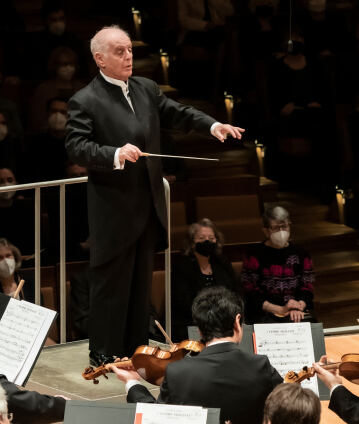Daniel Barenboim conducts Verdi

Daniel Barenboim has conducted acclaimed performances of the great Verdi operas. In this concert, he introduces works by the composer which were not initially intended for publication and offer insights into Verdi’s emotional life. The first work is his only string quartet, in a version for orchestra, in which operatic intensity is combined with elegance and melancholy. We also hear Verdi’s expressive Quattro pezzi sacri.
In the 2021/22 season, Daniel Barenboim conducts two all-Verdi programmes with the Berliner Philharmoniker. The first demonstrates the composer’s versatility with an opera overture, a chamber music work and a sacred work.
The fact that stage works were at the centre of Verdi’s oeuvre makes this encounter with the mature composer’s only contribution to absolute music all the more appealing: Barenboim and the Philharmoniker play the String Quartet in E minor, written in 1876, in a version for string orchestra. Verdi had become very familiar with the chamber music of the First Viennese School – which he admired throughout his life – during years studying in Milan. In the first movement of his quartet, he handles the themes and the dramaturgy of contrasts effortlessly and with originality, and with the fast-paced finale Verdi presents a fugue that is both skilful and inspired. Occasionally, the music dramatist also reveals himself in this work; particularly beautifully in the cantabile trio of the third movement, in which the cello takes on the role of an opera tenor, so to speak.
After completing Aida and the Requiem in the 1870s, Verdi actually declared his creative work to be finished. Fortunately, the brilliant Shakespeare operas Otello and Falstaff as well as some sacred works were to follow. The movements of the Quattro pezzi sacri, characterised by intimacy and compositional density, were written between 1887 and 1897 and were only brought together in a cycle at the request of the publisher Giulio Ricordi. Two a cappella pieces are juxtaposed with two movements with large orchestra; the vocal instrumentation ranges from four-part women’s choir to eight-part double choir with a short soprano solo. The composer Hans Gál called Verdi’s Quattro pezzi sacri his “epilogue to a life’s work”, in which everything is “concentrated on what is most essential”.
© 2022 Berlin Phil Media GmbH
Artists
Our recommendations
- Daniel Harding conducts Berlioz’s “Roméo et Juliette”
- Kirill Petrenko conducts Beethoven’s Ninth Symphony at the Brandenburg Gate
- Christian Thielemann conducts Brahms’s “Deutsches Requiem”
- Simon Rattle conducts Tippett’s “A Child of Our Time”
- Inaugural concert: Kirill Petrenko conducts Beethoven’s Ninth Symphony
- Kirill Petrenko conducts Dallapiccola’s “The Prisoner”